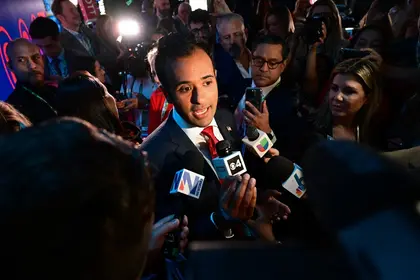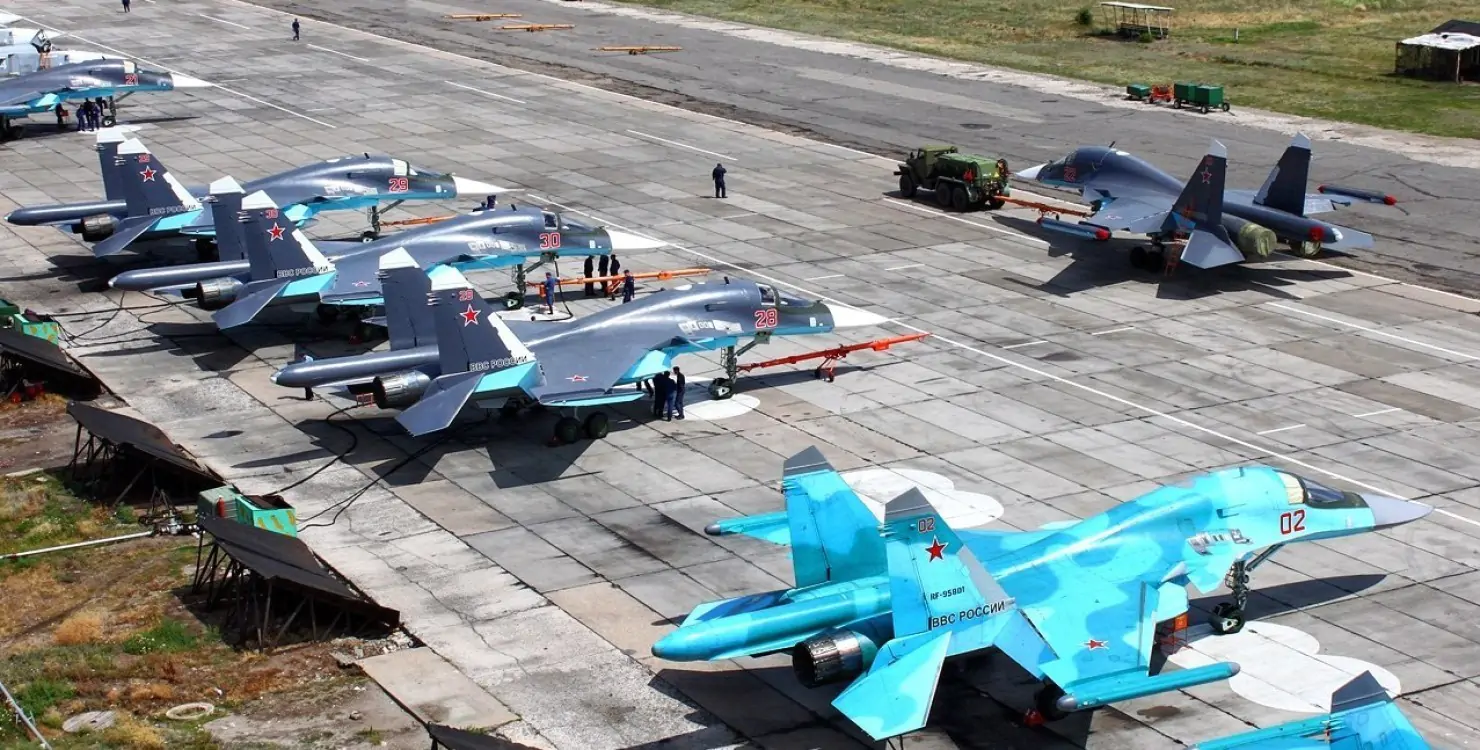I was not planning to listen to the recent Republican party primary debates on Nov. 8 because, at the time, I was buried in work aimed at helping Ukraine obtain a new tranche of much needed Western military aid. But a friend of mine convinced me to tune in because she thought I should hear Republican presidential candidate Nikki Haley's incisive approach to matters domestic and global (including Ukraine).
When I did, I realized that my friend was right about Haley – she did cut an impressive figure. I, nevertheless, was more struck by the opinions of another Republican candidate – often described as “Make-America-Great-Again without the Trump” – Vivek Ramaswamy.
JOIN US ON TELEGRAM
Follow our coverage of the war on the @Kyivpost_official.
If, at any earlier point, Ramaswamy's scandalous pronouncements were simply background noise in the upcoming campaign for the US presidency, his rather obnoxiously cavalier assertions about an issue for which I bled – the survival of the land of my ancestors – gave me serious pause, or, more frankly, got my goat.
In my state of anger and knowing that Ramaswamy is set to take part in the fourth primary debate on Dec. 6 in Tuscaloosa, Alabama, I decided that his remarks, or at least his key points, should not go unanswered.
The first issue to note about Ramaswamy's comments was his thinly disguised contempt for (or disregard of) Ukraine. He apparently had nothing to say about Russia's full scale naked aggression against the country – an attack meant not only to strip Ukraine of territory (as in 2014), but to eliminate its sovereignty altogether.

Washington Insider: US Congressional Hearings on Corruption in Ukraine Are Coming
He seemed to have no concern for the genocidal-in-scale damage done; the multiple tens of thousands of dead or wounded; whole Ukrainian cities left in ruins; children kidnapped and deported to an enemy state; and wholesale thievery and rape brandished as a tool of terror.
In Ramaswamy’s mind, Ukraine seemed be a land associated with a Trump impeachment conspiracy, a Hunter Biden corruption scandal, and a thorn in the side of US-Russia relations.
Ramaswamy's tirades against Ukraine’s President Volodymyr Zelensky got personal, suggesting him to be anti-democratic, a persecutor of Christians, and with links to Nazism. The problem is not simply that such attacks are baseless, but that some of his assertions betrayed an underlying train of thought that was, at the very least, troubling.
For one, Zelensky was elected in 2019 by a landslide margin and remains extremely popular to this day according to authoritative sources (his approval ratings easily score in the range of 75-90 percent). Additionally, the Nazi reference appeared to stem from a Kremlin campaign in 2022 that the US State Department condemned in the revealingly entitled study: “To Vilify Ukraine, The Kremlin Resorts to Anti-Semitism.”
Absolutely unnerving was the effortless way Ramaswamy seemed to link the word Nazi to Ukrainians in general. He clearly had no clue about the Ukrainian experience in World War II. In eastern Ukraine, most families had a member who served in the armies that swept the Nazis out of Eastern Europe; a couple of million had the misfortune during the height of German occupation to be shipped to Germany to serve as Ostarbeiters (slave laborers); while the Ukrainian Insurgent Army (UPA) lost thousands of souls to either Nazi concentration camps, firing squads or lamppost hangings.
I found myself becoming increasingly curious about what would possess Ramaswamy to take this stance, i.e., what would make him so callous to the suffering inflicted by the Russians on the Ukrainian nation. These reflections, and my subsequent short research, bore some seriously disturbing (and anomalous) fruits that cast the erstwhile presidential candidate's possible motives in very dark colors.
Possible motives and influences
Why would a figure trying on occasion to out-MAGA even Trump be so interested in playing a “Nazi card” with anyone? After all, the more outlandish section of the MAGA phenomenon, with its accent on constantly stirring the fear of the other had less to do with classic Anglo-American conservatism and more to do with the populist right of Europe in the 1930s (fascism might just be too strong a word) that seems to have been making a comeback in the 21st century.
Having best-friended an authoritarian rightist like Victor Orban, might not someone admonish Ramaswamy and Co. (political commentator Tucker Carlson and politician Majorie Taylor Greene also come to mind here) about not throwing stones when living in actual glass houses?
The Nazi reference has an even more curious component to it. The same canard has been thrown at the Ukrainians from the hard (call it neo-Stalinist) left. Ukrainians, having earlier opposed the Soviet Union (mother of all revolutions) and now seeking military assistance from what might be termed the “Imperialist West” would automatically seem to qualify them as fascists, or Nazis.
Indeed, such arguments would suggest that Nazism had nothing inherently to do with the Holocaust or the genocidal slaughter of Jews and that the term could – paradoxically – be applied to the Jewish State (note the slogans at many of the recent pro-Hamas rallies around the world).
Seeing this apparent confluence of two supposedly deadly ideological opposed camps was striking on so many levels. Equally concerning is that the meeting of the “yahoo” minds appears not too far afield from the toxically fertile brain of far-right Russian political thinker Alexander Dugin, author of mind-bending pseudo political theoretical tracts with fun names like “Foundations of Geopolitics: The Geopolitical Future of Russia” and “The Fourth Political Theory: Beyond Left and Right But Against the Center.”
Since his days of dabbling with something called “National Bolshevism” in the wake of the USSR's breakup, Dugin had propagated a global convergence of ultra-left and ultra-right forces led by a resurrected Russia against the so-called decadent (if temporarily victorious) democratic West, and dreamt of an apocalyptic clash that would return Russia to its rightful “civilizational” place at the head of the global parade.
Notwithstanding the fringe nature of his thinking, Dugin has become someone to be reckoned with in the last two decades. Forces in the Kremlin have come to consider him a master strategist or, more mystically, something of a prophet. One might say that Dugin has emerged as Russian President Vladimir Putin's Rasputin. If so, then Ramaswamy appears to be in a “mind meld” with some seriously dangerous folks.
Given Russian interference had been detected both in the 2016 and 2020 US elections, perhaps it is worth ending with a rhetorical question or two: “Mr. Ramaswamy, have you discussed your position on Ukraine with anyone in the Kremlin?”; or “Mr. Ramaswamy, have you ever made any deals with the Kremlin before the US-Russia deal you proposed recently?”
But to do that would risk playing the same impugning game as Mr. Ramaswamy himself. So perhaps it’s better to end the commentary with a simpler question, taken straight from American historical lore: “Sir, have you no shame?”
Walter Zaryckyj is executive director of the Center for US-Ukrainian Relations. Zaryckyj completed his undergraduate and graduate work at Columbia University and taught political science at New York University for nearly three decades before moving on to do postdoctoral research work on Eastern Europe.
The views expressed are the author’s and not necessarily of Kyiv Post.
You can also highlight the text and press Ctrl + Enter






